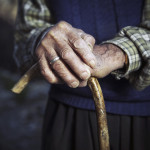People who are 55 or older have roughly the same degree of immune activation as younger people, according to a small study presented Wednesday, July 21, at the XVIII International AIDS Conference (IAC), taking place July 18 to 23 in Vienna. This runs counter to speculation that aging with HIV significantly worsens immune activation.
The current bad boy in the world of HIV research is immune activation, whereby cells that should be quieting down remain in a chronically active state, which can ultimately lead to serious illnesses such as cardiovascular disease. Immune activation, and its consequences, has prompted two major advisory bodies to change antiretroviral treatment recommendations over the past year—both encouraging treatment much earlier in order to shut down activation.
Another growing concern among researchers and activists is the role that aging might be playing in people whose immune systems are already under tremendous challenge from HIV. A number of studies have suggested that immune activation might worsen as people with HIV age. Moreover, increased immune activation—to infectious diseases such as cytomegalovirus (CMV)—has been documented in older HIV-negative people.
To determine what role age might play in immune activation levels, Philip Grant, MD, and his colleagues at Stanford University in Palo Alto, California, conducted a pilot study with 24 HIV-positive adults, all of whom had fully suppressed virus. Half were 55 years old or older, and the other half were 25 to 40 years old. The average current CD4 count was 559, and the average of the participants’ lowest-ever (nadir) CD4 count was 220. The groups were similar in most characteristics, though the older participants tended to have lower current CD4 counts than the younger participants.
Grant’s team looked at a variety of signs of immune activation. These included CD38+ markers on CD4 cells and common immune system signaling proteins called cytokines that have been associated with immune activation. These include Rantes, VCAM-1, ICAM-1 and others.
Ultimately, Grant and his colleagues found little evidence of more immune activation in older participants than in younger participants. All of the participants had unusually high levels of cell activation and high levels of activation-related cytokines, but there was no clear signal of a difference in activation related to age.
“In this pilot study in virologically suppressed individuals, there did not appear a clear pattern of accelerated immune aging,” the authors concluded. “Surprisingly there were few age-associated changes in the CD8+ compartment and no consistent increases in pro-inflammatory cytokines with age.”
Advertisement
Advertisement
Advertisement






Comments
Comments